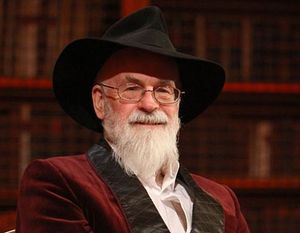 |
Not having a TV has its advantages. It means that when you do watch a programme you are not immunised from its effects by long usage of the media. It still has the capacity to shock. Thus it was that I went next door to my mother’s, to watch Sir Terry Pratchett on BBC Two last night at 9pm tell us all yet again (you can’t seem to open a newspaper these days without seeing his face and hearing his views on the subject) that we should have the right to assisted suicide in this country.
My mother, aged 87, was having none of this. While I joined all the other thousands of voyeurs up and down the country to watch from the safety of our armchairs a man actually die on screen, she resolutely held up her copy of the Daily Telegraph so as to block out the telly and fortified herself with a large whisky and a packet of cigarettes. From then on, all I heard from her was the occasional “Disgraceful!”
Actually I agree with her – and it was voyeuristic in the extreme. Would I have chosen to watch Sir Terry simply host a chat show about euthanasia? No, of course not. But here was the full, compelling, visual creepiness: the soft muzak in the background, swelling at appropriate moments, the slow, respectful narrative and the very civilised demeanour of the gentleman about to drink the poison – a millionaire businessman called Peter Smedley. He described dying by motor neurone disease in his best Biggles manner as “a beastly undignified business”; his wife chimed in, saying (as people do) “I wouldn’t put my dog or my cat through such an undignified ending.” They both exemplified throughout the best behaviour of tactful, brave, secular Britain – as shown (by implication) on the tactful, brave, secular BBC.
Behind the programme was the relentless, drip drip message: Sir Terry, with his beard, black hat and earnest expression looking like the original gnome of Zurich, and who himself has early onset Alzheimer’s, constantly reminding the viewer, “This is somebody’s decision”, “Peter has made his choice” and asking pointedly, “Who owns your life?” (more swelling chords at this point.)
Having made this point several times, the related message was drip-fed to viewers: why can’t we be allowed to die like this in dear old Britain, in our own comfy armchairs, surrounded by loving relations, rather than the nuisance of slumping on an anonymous sofa in an industrial estate in Zurich (you’re not allowed to do “it” in residential areas, apparently) and helped by a rather sinister-looking blonde “escort”; death by Dignitas.
At this stage of the macabre docudrama, I wanted Peter Smedley to hurl the deadly potion in the escort’s face and beg his wife to take him home and nurse him (as she had wanted to do). He didn’t. Nor was the viewer told if the two local doctors required to assess the Dignitas clients ever rejected a would-be suicide as unsuitable. Given the overall fee of £10,000 and their regular cut for their services, I think this is unlikely. Terry tells the viewer, “One day there will be a protocol about this”. We watch him and the blonde Valkyrie hug each other as he tells her: “Can I say I was extremely impressed by how it was done.” He assures the viewer that it was “an extremely peaceful way to die” and that he wants to “stay around as long as possible to see assisted dying made possible in the UK”.
This was consummate propaganda on the part of the BBC. The quick visit to a hospice, and the few words allowed to a carer there, did not remotely present the alternative case. The programme was weighted entirely on the seemingly reasonable and unanswerable notion that just as we have choice in other areas of our lives, we should have the choice to die when and how we want (and not have to pay £10,000 for the privilege). The only time “God” was given a faint mention in the entire programme was an unfunny joke made by Ludwig Minelli, the millionaire founder of Dignitas; he likes to offer clients a selection of teas before they drink the poison, describing himself as a “teaologian” – “the only theology I accept.” Ha ha.
“Teaology” is probably the Beeb’s religion too. Where was impartiality here? The BBC defends itself by saying it will make other programmes showing an alternative point of view at a later date. Christian programme-makers need to push for this urgently; otherwise the gnomes of Zurich will have won. As my mother said, it was “disgraceful”.
Francis Phillips
Catholic Herald
